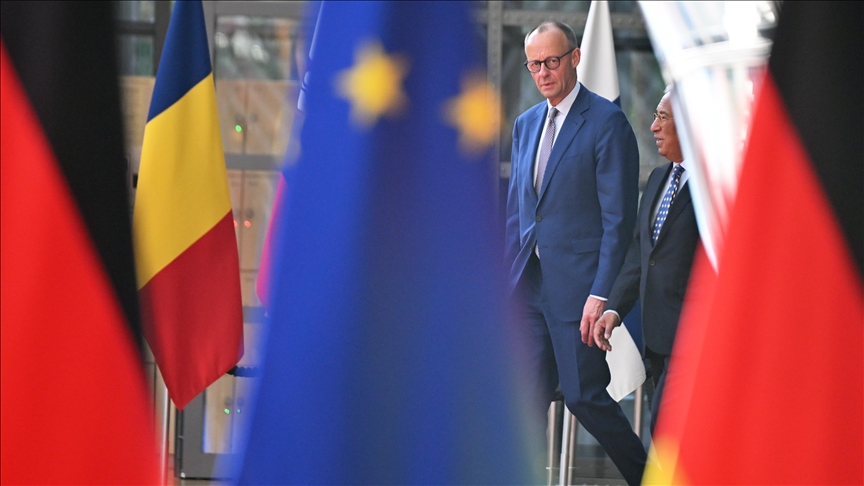Germany's new era: Merz’s coalition prioritizes migration, economy, defense
In his 1st week as German chancellor, Friedrich Merz launches strict border controls to curb irregular migration while announcing major policy reforms to revitalize stagnating economy and strengthen national defense

BERLIN
Germany's new conservative-led coalition government has moved quickly to implement its agenda in its first week in office, with unprecedented measures to curb irregular migration.
On the directives of conservative Chancellor Friedrich Merz, the Interior Ministry has announced enhanced border controls, as well as new procedures, to turn back irregular migrants and asylum seekers at the country’s borders.
Interior Minister Alexander Dobrindt has revoked a 2015 verbal instruction -- issued during Angela Merkel's chancellorship -- that permitted undocumented immigrants to enter Germany and seek asylum on humanitarian grounds.
The new government's move aims to reduce asylum applications, which reached 352,000 in 2023, and showed only a moderate decline to 250,000 last year. The Merz government argues that under EU law and directives, asylum seekers must file their applications in the first EU country they enter -- such as Greece or Italy -- rather than traveling to Germany before their applications are processed.
Beyond strengthened border controls, the Merz government plans to reform Germany's asylum system significantly. Changes include faster processing procedures and increased deportations of rejected asylum seekers and violent offenders to their home countries.
The government intends to swiftly conclude bilateral agreements with transit and origin countries to streamline the repatriation process for rejected asylum seekers.
- Merz announces 3 major goals
In his first television interview after being sworn in as chancellor, Friedrich Merz laid out three main priorities for his government, and said they will focus on tackling the migration crisis, revitalizing the stagnating economy, and strengthening national defense.
“We face three major problems today. First, there's the migration crisis, we need to find better solutions. Second, our economy has been stagnant for three years, we must implement reforms,” Merz told the public broadcaster ZDF.
“And in my view, the greatest challenge is that our country's freedom and peace are being threatened like never before. As the government, we must take action,” he stressed.
The coalition agreement between Merz's conservative alliance CDU/CSU and their junior coalition partner the Social Democrats (SPD) aims to modernize Germany's manufacturing and industrial base, and increase “the potential growth of the German economy to well over one percent.”
The government's economic agenda includes significant tax cuts for businesses, massively increasing investments in key sectors, securing affordable energy for manufacturing and industry, reducing bureaucratic burdens, and establishing a digital ministry to drive re-industrialization through technological advancements.
Germany's economy has struggled under the previous government's leadership, experiencing two consecutive years of contraction. The new government faces significant economic hurdles -- unemployment stands at 6.3%, with 2.93 million people out of work in April 2025, up 182,000 from the previous year. Though inflation has cooled from its 2022 peak of 6.9% to an expected 2.1% this month, polls show it remains the top economic worry among Germans.
- Boosting defense spending
While immigration and economic reforms dominate Merz's domestic agenda, he faces equally pressing foreign policy challenges. Chief among these are Russia's ongoing war in Ukraine and uncertainty over US President Donald Trump's foreign policy stance and the future of transatlantic relations.
In recent months, Merz has repeatedly emphasized the need to bolster Germany's defense capabilities, citing both growing threats from Russia and indications that the Trump administration might scale back its security commitments to Europe.
The new coalition government has launched a historic defense investment package through a constitutional amendment that bypasses the “debt brake” rule, allowing Germany to borrow billions of euros for new weapons.
Through this comprehensive plan, Germany aims to meet NATO's 2% GDP target, purchase advanced weapons systems, and enhance military cooperation with European partners. The Merz government plans to take a leading role in European defense and strengthen partnerships with non-EU allies including the UK, Türkiye, and Norway.
During his visit to Brussels after his Feb. 23 election victory, Merz emphasized that Germany's increased defense spending is not aimed at engaging in conflict, but rather at deterring attacks on the country and Europe.
“We must be in a position to defend ourselves, so that we will not have to. Now is the time to make Europe safer and more resilient,” he told reporters following his talks with top EU officials. “We agree: there will only be peace in Europe if we are strong,” he stressed.
The billions of euros allocated to defense will address critical capability gaps in the Bundeswehr following years of underfunding. Modernization efforts will cover multiple domains, including advanced Leopard battle tanks, new fighter jets, armed drones, and sophisticated missile defense systems.
Anadolu Agency website contains only a portion of the news stories offered to subscribers in the AA News Broadcasting System (HAS), and in summarized form. Please contact us for subscription options.







